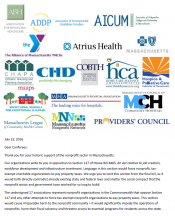Nonprofit property tax exemption is not a narrow and technical concern for nonprofit CEOs and finance staff; it is a right universally supported by nonprofits and their supporters across the country. A challenge in Massachusetts points up the need for many voices – nonprofits and funders alike – to stand up for their missions and speak out in opposition to efforts to divert resources away from mission.
First some background. Stung by the news that UMass Lowell — a public university, not a nonprofit — plans to purchase and take off the tax rolls property worth several hundred thousand dollars in tax revenues, a state legislator from Lowell, Massachusetts is promoting an amendment that would require nonprofits purchasing property currently on the tax rolls to pay property taxes over the course of four years. The measure, attached to an economic development bill, was approved by the House, but not included in the Senate version. The two bills are now in a conference committee.

A broad coalition of nonprofits is actively advocating for rejection of the property tax mandate. In a letter to key legislators, the Providers' Council, the Massachusetts Nonprofit Network, and several other nonprofit associations urge lawmakers to reject the House language because "it would both directly contradict already existing state and federal laws and shatter the social compact that the nonprofit sector and government have worked for so long to build." The 17 organizations stated further, "This section would cause irreparable harm to the nonprofit community – it would significantly impede the operations of nonprofits, harm their fiscal solvency and threaten access to essential programs for residents across the state."
Lowell philanthropist Nancy L. Donohue has also joined in the debate, writing an op-ed opposing the city's efforts to divert nonprofit resources to the public treasury. "Nonprofits are the engines that create genuine community, quality of life and opportunity, especially for people from less privileged backgrounds. The burden nonprofits place on our government is tiny compared to the social and economic benefits they create." Donohue is most direct in explaining the impact of government policies on local communities and fundraising: "Every dollar we take from them for the government, regardless of our intention, is another dollar they have to raise or another dollar of service they cannot provide."
The issue is likely to be resolved soon because the Legislature is scheduled to adjourn at the end of the month. The message, however, is clear and lasting: together nonprofits and individuals who care about their mission and impact can and should speak up when policies threaten their ability to serve communities.
